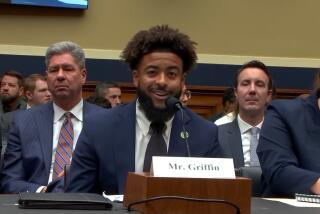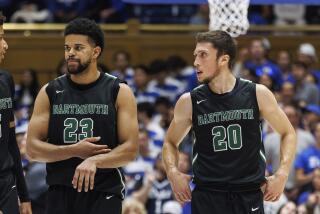Revenue Power of Georgia Athletes Cited : But School President Denies Players Are Seen as ‘Raw Material’
- Share via
ATLANTA — The revenue potential of some athletes is part of the reason they are admitted to the University of Georgia with lower academic standards than ordinary students, school President Fred C. Davison testified Wednesday.
But he disagreed with a statement attributed to another school official that that athletes are merely “raw material.”
“Every student that comes to the university benefits by being there,” Davison said. “If an individual learns only how to communicate better, that is some justification.”
Davison was the final defense witness in the federal trial of former instructor Jan Kemp’s suit against two university officials in which she alleges that she was demoted and fired from the remedial development-studies program because she protested preferential treatment of athletes.
Davison also said he believes that high schools have failed to provide student athletes with a basic education, creating a “subculture” of football and basketball players who have graduated from high school but cannot read.
Davison said he has been concerned for several years about the effects of the so-called “2.0 Rule,” which allows athletes to enter college if they leave high school with a C average.
He recalled that in 1982 he convened a group of university officials from across the nation to discuss ways to deal with the problem.
In response to a question from the defense, Davison, who said he does not play an active role in the admission process, testified that he had no knowledge of politicians, alumni or contributors ever influencing a decision on whether a student is admitted to the university.
Defendants in the case are Developmental Studies Director Leroy Ervin and Vice President for Academic Affairs Virginia Trotter. The characterization of athletes as raw material was attributed to Ervin.
Defense attorney Hue Henry presented a letter addressed to Ervin that concerned a student, identified only as R.C. of Cartersville, Ga., who was seeking a reconsideration of his admission application. Henry said the student’s grandfather, father and mother had served in the state legislature.
The letter said the student had high recommendations and had been referred to Ervin by Davison.
Davison testified that he refers all admissions queries that come to his office either to academic affairs or admissions officials.
He said many inquiries about admissions come to him because people don’t know where else to go.
“If you can’t think of anyone else to call, call me,” Davison said.
Ervin testified earlier that Kemp caused disunity in the developmental-studies program and failed to do scholarly research.
Also among the defense witnesses was Vince Dooley, the Georgia athletic director and football coach, who said he favors academic exemptions for athletes, but only in special cases. Dooley also testified Tuesday that Kemp “did an outstanding job” in helping student athletes.
After the defense rested, Kemp returned to testify as a rebuttal witness. She disputed several points of defense testimony, particularly that she was too harsh on students, that she failed to get along with colleagues and that she was insubordinate.
Kemp is seeking reinstatement, back pay and damages in the five-week-old trial.
More to Read
Go beyond the scoreboard
Get the latest on L.A.'s teams in the daily Sports Report newsletter.
You may occasionally receive promotional content from the Los Angeles Times.









